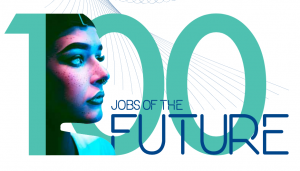
I was on Australian Channel 7 Sunrise television yesterday talking about the future of work, and what it means for career changers – thinking about where the opportunities are, and what can people do to make the most of them.
I only had a few minutes on TV and I had a lot more to share, so I’ve written up this blog post.
The topics I’ll cover in this post are:
- Why is it that so many people thinking of changing careers?
- Where are the job opportunities right now?
- How do people maximise their career adaptability in order to successfully change careers?
- What will work look like in the future?
- What about career opportunities beyond the immediate future?
Why is it that so many people thinking of changing careers?
According to survey research conducted by ING Future Focus, about 3 million people in Australia are thinking of changing careers post-pandemic. The research found 35 per cent of surveyed Australians wanted a new job after COVID-19, and 17 per cent were rethinking their career path entirely.
I think the reason for this is twofold. First, the ABS reports that about 1 million Australian jobs have been lost since the beginning of the pandemic, affecting disproportionately hospitality and retail jobs, casual workers, young people, women, and minorities. The rest of us are working differently than ever before – as businesses have moved their operations online, many of us have been working from home. New roles have also emerged very quickly. Back in February, I’ll bet no one would have guessed that they’d be undertaking tasks around crisis management, staged return to work management, or working from home co-ordination. I think working from home is set to continue, as businesses and organisations reinvent themselves permanently as more online and less ‘bricks and mortar’.
The second reason is that while we’ve been experiencing this instability, we’ve been at home with some time and space to reflect, and to think about what our options could be. Some will be prioritising financial safety in their reflections, and others will be thinking about where the opportunities are for them in the new world of work.
Where are the job opportunities right now?
At present I’d describe the job opportunities out there are being about core needs – safety, food, health, and entertainment while at home. The opportunities are what you’d expect – many job roles in healthcare and social care, in essential retail (supermarkets), and in logistics and delivery work. As the economy opens up more, there will be more opportunities in retail again, but hospitality and tourism are likely to be rocky labour markets for some time.
There is also an interesting trend around big companies like banks and telcos returning their global operations to onshore, so there are more Australian jobs in call centres, back-end operations, data processing, and IT. My little sister just last week got her first full-time job working at a major insurance company processing claims because the company brought these functions back to Australia.
How do people maximise their career adaptability in order to successfully change careers?
Career change is a multi-step process. The first step is to make space for yourself to think and act. No one who is under severe financial stress can think strategically or creatively about their careers, so ensure that you have done everything you can to ensure your financial safety first. This might be applying for government benefits, talking to your bank to stop mortgage payments temporarily, or making the most of the job opportunities I’ve described above, even though it may not align 100% with where you want to go.
The second step is to start to think about yourself not in terms of your job title, but in terms of the values, strengths and capabilities that you have. For instance, someone who works in hospitality might have great interpersonal skills and abilities to resolve conflict, and find great satisfaction in that. Engineers tend to be great project managers with well-developed analytical capabilities. It can sometimes be difficult to reframe in this way by yourself, and in this case talking with other people (such as colleagues or friends who are prepared to be honest and up-front with you) can help to help illuminate what your particular strengths are. Professional career counsellors are also great at helping with this process.
From your reframing, you can then go ahead and start to explore opportunities that are out there, or that you might be able to create. Speaking of creating opportunities, now is probably not a good time to throw everything you have into a new venture, but it is a great time to start exploring side gigs if you’ve got an idea for one (virtual clutter organising anyone? With all this working from home I really need someone to Marie Kondo my computer!)
You may also need to upskill or reskill for new opportunities. You can often start the skilling process informally and cheaply / free through online platforms like Linkedin Learning, Youtube, or MOOCs through Coursera. If you want to get a formal credential, and this can be an advantage in the jobs market, TAFES and universities are currently offering subsidised 6-month certificate courses at undergraduate and postgraduate level in areas of national priority such as aged care, information systems, and education. Griffith University, where I work, is offering certificates in cybersecurity and data analytics, which are good areas of jobs growth.
For more on career planning in an era of disruption, you can check out my blog post on this topic here.
What will work look like in the future?
I’ve been involved in several research projects investigating the future of work. While none of them predicted the COVID-19 pandemic specifically, we did predict that there would be major changes to the world of work over the next few years. My research suggests that change is actually going to become the ‘new normal’, and many of us will need to reinvent ourselves professionally multiple times throughout the course of our careers.
We’ve actually got a ‘double whammy’ of change happening right now. We’re in a pandemic, and we’re also at the beginning of the 4th industrial revolution[1]. But the good news is that history suggests we’re fairly resilient to these kinds of changes. For instance, the Plague in the Middle Ages in the late 1300s led to the Renaissance in the 1400s – an unprecedented time of expansion in science, culture and the arts.
Our 21st century post-pandemic expansion is going to be digital. It’ll be about things like artificial intelligence, robotics, augmented reality, and cloud computing. On the basis of our experiences in the last few months I suspect and hope it will also be about reconnection with community, social engagement, and environmental sustainability.
What about career opportunities beyond the immediate future?
At the moment the economy is in a deep recession. Even while the recession is going on, COVID-19 is driving enormous digital transformation. When the economy recovers, there will be even more digital innovation across many fields.
In the research project 100 Jobs of the Future, we interviewed experts and asked them to identify key trends and advances in their fields, and project what key work opportunities in the next 10-20 years might be. The 100 jobs are meant to inspire and help young people (and not so young people!) see possibilities in the next wave of careers.
There is a digital thread that runs through 99 of the 100 jobs[2] that were generated through the research. But for those of us who aren’t full-stack programmers and have no desire to be, there is good news as well. Only about 20 of the future jobs were digitally intensive – ones around things like cybersecurity, machine learning programming, and quantum computing development.
The rest of jobs rely on the use of digital technology in various ways, particularly to connect with other people – to care, to educate, to persuade or inform – or to help with practical tasks like food production or building or cleaning. Others key themes that ran through some of the jobs were scientific advancement, and advanced use of data.
You can browse all 100 jobs or do the jobs explorer quiz at the website 100jobsofthefuture.com, but here is a sample of them by key theme.
Connection with people jobs – Nostalgist: This is a role in aged and dementia care. Nostalgists work with people to recreate experiences and contexts from bygone eras to help them feel safe. Other people jobs include: Virtual tourism manager, personal brand and content manager, digital memorialist, 100 year counsellor, cyborg psychologist.
Practical jobs – Biofilm installer: Biofilm installers are a kind of specialised plumber who installs a layer of good bacteria into pipes and waterways to help break down waste. Other practical jobs: Robot or drone mechanic, energy and data systems installer
Organised jobs – Virtual clutter organiser: This one’s for those of us who have ever felt a little overwhelmed about the volume of your email, online photos or other data. You can hire a virtual clutter organiser to sort out your online data, Marie Kondo style
Science jobs – Biomimicry innovator, de-extinction geneticist, terraforming microbiologist
Health jobs – Nutri-gutome consultant, genetics coach, data-informed diagnostician
Outside jobs– Cricket farmer, digital apiarist, agroecological farmer
Creative jobs – Autonomous vehicle profile designer, swarm artist
Jobs I would personally love to do out of the 100 jobs: Trendwatcher, fusionist (someone who brings people from different disciplines together to solve problems and generate ideas), lifelong education advisor (and I’m already doing all three of these!)
[1] Researchers argue that there have actually been 3 other industrial revolutions – the first (and most famous) one kicked off in the 1700s with people moving off the land and the invention of the steam engine.
[2] If you were wondering about the non-digital 100th job, it’s Analogue Experience Guide – someone who helps people disconnect from their devices and reconnect with nature.
